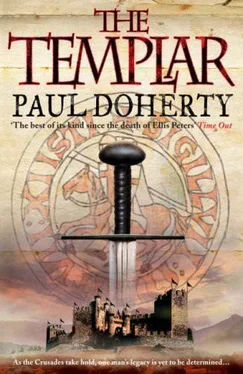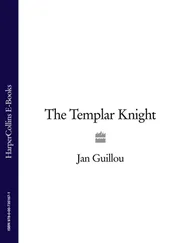P. Doherty - The Templar
Здесь есть возможность читать онлайн «P. Doherty - The Templar» весь текст электронной книги совершенно бесплатно (целиком полную версию без сокращений). В некоторых случаях можно слушать аудио, скачать через торрент в формате fb2 и присутствует краткое содержание. Год выпуска: 2010, ISBN: 2010, Издательство: Minotaur Books, Жанр: Исторические приключения, на английском языке. Описание произведения, (предисловие) а так же отзывы посетителей доступны на портале библиотеки ЛибКат.
- Название:The Templar
- Автор:
- Издательство:Minotaur Books
- Жанр:
- Год:2010
- ISBN:9780312576837
- Рейтинг книги:5 / 5. Голосов: 1
-
Избранное:Добавить в избранное
- Отзывы:
-
Ваша оценка:
- 100
- 1
- 2
- 3
- 4
- 5
The Templar: краткое содержание, описание и аннотация
Предлагаем к чтению аннотацию, описание, краткое содержание или предисловие (зависит от того, что написал сам автор книги «The Templar»). Если вы не нашли необходимую информацию о книге — напишите в комментариях, мы постараемся отыскать её.
The Templar — читать онлайн бесплатно полную книгу (весь текст) целиком
Ниже представлен текст книги, разбитый по страницам. Система сохранения места последней прочитанной страницы, позволяет с удобством читать онлайн бесплатно книгу «The Templar», без необходимости каждый раз заново искать на чём Вы остановились. Поставьте закладку, и сможете в любой момент перейти на страницу, на которой закончили чтение.
Интервал:
Закладка:
Three days had passed since the Count had left. The army had slowly moved on, close to the town of Radosto, still shadowed by imperial troops. There had been further clashes, and pillaging by the cross-bearers, for despite all the proclamations and ordinances, not all companies followed the same strict discipline as the Poor Brethren. The worst of these was a gang of ribalds from Montpellier called the Beggars’ Company, led by Jehan the Wolf. A notorious character, Jehan had been hired by the city fathers to drain Montpellier’s moat and ditches. He did so, but also developed a skill second to none of poaching geese and ducks from the same moats and ditches, birds that belonged to local farmers or the city guilds. He then set himself up as a successful fowler, selling fresh bird meat to all and sundry. When the call from Clermont came, Jehan realised rich pickings were to be had elsewhere. He immediately used his wealth and notoriety to organise his own company, most of whom were denizens of the city slums. The Beggars’ Company swarmed with codgers, counterfeiters, jesters and japers, moon people and tumblers. Such men and women thought Jerusalem was only down the road or just beyond the far horizon. The harsh journey down the Via Egnetia had shocked and embittered them. As Father Alberic commented, the Beggars’ Company had no knowledge of scripture except for one verse: ‘Live for today, do not worry about tomorrow or about what you will eat, drink or clothe yourselves in.’ Jehan and his legion of imps truly believed the Lord would provide, and if not, they would gladly give heaven a helping hand.
Jehan was assisted by two lieutenants, ugly bruisers who rejoiced in the names of Gargoyle and Babewyn. These organised his horde of rogues, and as they approached Radosto, the Beggars’ Company simply disappeared. After an absence of four days, they returned bringing back cattle, sheep, chickens and fresh meat for the pot, as well as valuable tapestries, cloths and precious goods, gifts they claimed from grateful local inhabitants. No one questioned them, though Hugh whispered hoarsely that they’d pay soon enough for the feast Jehan had prepared. None of the captains of the companies or the great lords had the authority or status to bring Jehan to account. More importantly, none of them could resist the smell of freshly cooked meats, spiced and garnished with herbs, that wafted through the camp.
Like some King of Misrule, Jehan entertained all the leaders to a great banquet. Eleanor, Hugh and Godefroi attended, their bellies sick for food, their throats craving the lush wines and fresh fruits on offer. The banquet was a clever move. Count Raymond was absent. Jehan played on the hunger and bitterness of the cross-bearers, turning them into his accomplices. Platters of fresh meat, duck, swan, pork and beef, were served in the light of roaring fires and flaring pitch torches. Jehan entertained them with tumblers and mummers as well as recounting a tale of how he had once swindled a fat wine merchant and a pompous canon of Montpellier.
‘I ordered some wine,’ he roared from his throne-like chair. ‘I told the merchant’s apprentice I would pay for it once it was delivered. He followed me to the cathedral. I told him to wait outside while I went in and accosted the canon. I told him I’d brought my nephew to be shriven as he had an insatiable hunger for money, a deep avarice, so would the canon talk to him and, in return, accept as a gift the barrels of wine I’d brought on the cart? Of course the canon agreed. He followed me outside and glimpsed the apprentice guarding the wine. I told him to wait, approached the apprentice and said that the fat, wealthy priest beckoning at him would settle the bill.’ Jehan’s story ended in roars of laughter at the mutual bewilderment of both confessor and penitent: the latter demanding money whilst the priest reproached him for his avarice. Truth eventually came with time, but by then, both Jehan and the wine had disappeared.
Eleanor regarded Jehan as a lying boaster, though she marvelled at his cunning. Hugh and Godefroi, however, as they surveyed what was being served and the plunder Jehan had gathered on his so-called foraging, tried to reassure themselves that what he had brought was legitimate. After all, if the Emperor wouldn’t supply them, what choice did the cross-bearers have but to take it for themselves? As Hugh and Godefroi watched Gargoyle, Babewyn and others display the glorious raiment and precious jewels they’d brought back to the camp, their anxiety deepened. They were confirmed in this by Theodore, a wandering Greek mercenary who had joined Count Raymond’s army and become closely attached to the Poor Brethren. Theodore claimed to have been born near Smyrna, of Greek and Norman parentage. He was certainly an expert swordsman, who owned his own destrier and pack horse. He was of medium height, his dark face bearded. In character he was courteous and kind, and he soon impressed Hugh and Godefroi with his knowledge of the Turks, the Greek army and the countryside they were travelling through. He also proved himself to be an able fighter, allowing Hugh and Godefroi to examine the special armour he wore: a mail-lined jerkin over a leather corselet made out of lamellar with a gorget of similar material and a ridged steel helmet. He was also skilled with the bow and couching a lance. A born soldier, Theodore had fought against Bulgar, Alan and Turk. He fascinated the Franks with his description of the Turks whose territory they were about to invade, describing them as swift fighters, deadly and ferocious, and skilled in mounted archery, which always confused their enemies. He also described the rigid discipline of the Emperor’s armies, its heavy and light cavalry and its well-organised infantry led by the Imperial Guard. He explained how Alexius organised his army into turma of about three thousand men, which in turn were subdivided into eight numeri each of about three hundred and fifty, delineating the various officers and standard-bearers as well as their military code. The Byzantine army was also well supplied in the field, being supported by siege trains, engineers and physicians. Hugh was deeply impressed by such organisation and began to impose similar discipline on the hundred or so Poor Brethren. He organised them into units of ten which he called a conroy, dividing the knights from the serjeants and allocating duties such as cooking and physic to various individuals, including even women and children.
Theodore arrived late for the Beggars’ banquet but immediately engaged Hugh in hushed conversation, talking quickly in the lingua franca of the Middle Sea. Hugh listened intently, then turned and whispered to Eleanor how Theodore believed Jehan’s men had not just collected supplies but had attacked and pillaged the villa and estates of a high-ranking local notable, a crime the Greeks would not ignore. The following morning, Theodore’s prediction was proved correct. The sun had hardly risen when scouts galloped into the camp, shouting how an imperial army was emerging out of the mist in column of march and deploying for battle. At first, the Frankish commanders thought this was simply a manoeuvre and moved to the outskirts of Radosto only to find their way blocked by imperial troops. Hugh and Godefroi were summoned by the Vicomte de Béarn for a hasty meeting near a clump of trees. Envoys were dispatched but imperial troops drove them off with a hail of arrows. Apparently the Greeks were intent on battle and all the Franks could do was sit and wait. Eleanor closed her eyes and dozed. After last night’s feast, she was no longer hungry but felt thirsty, tired and slightly sick, her joints aching. For a brief while she wondered if the whispers circulating the camp spoke the truth. Had they made a mistake? Should they have come? Was this truly God’s work?
Читать дальшеИнтервал:
Закладка:
Похожие книги на «The Templar»
Представляем Вашему вниманию похожие книги на «The Templar» списком для выбора. Мы отобрали схожую по названию и смыслу литературу в надежде предоставить читателям больше вариантов отыскать новые, интересные, ещё непрочитанные произведения.
Обсуждение, отзывы о книге «The Templar» и просто собственные мнения читателей. Оставьте ваши комментарии, напишите, что Вы думаете о произведении, его смысле или главных героях. Укажите что конкретно понравилось, а что нет, и почему Вы так считаете.












